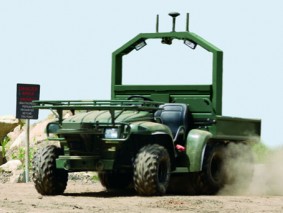Machines That Learn

2005 could be the year the machines rise, according to David Isaac's December 31, 2004 article in Investor's Business Daily titled "Robots Are Learning, But No 'Terminators' Are About To Appear".
According to the article, scientists at the Center for Automated Learning and Discovery at
Carnegie Mellon University are teaching machines how to "learn".
The center's director, Tom Mitchell, is using a concept called reinforcement learning to help robots learn, in some respects, their right and wrong actions through experience.
The premise of the concept is that these robots will learn from interacting with its environment, learning the plusses and minuses of an action it takes through the result (in Mitchell's case, the right and wrong is determined by the scientist).
This is opposed to simply programming a set of rules into the robot, and leaving it at that. In this case, the robot learns by doing.
The concept, and related ones, can have a lot of benefits, according to an interview with Mitchell posted on the Carnegie Melon School of Computer Science webpage, as scientists today are dealing with data sets much larger than any scientist has ever dealt with before.
"We’re specifically interested in finding what kind of computer algorithms we can come up with that can find general trends in large, detailed data sets," says Mitchell. "It’s really hard by hand to find those patterns, and learning algorithms for finding those patterns—data mining algorithms—are becoming increasingly important in empirical science."
If we can turn robots into our smarter friends, there is a lot more about biology, chemistry, physics, and ourselves, that we can learn.

The technology has a natural military use, so it's no surprise that IBD's Issac notes that a companies like Applied Perception and IRobot are working with the Defense Advanced Research Projects Agency on similar projects.
One promising area of study is called "swarm intelligence," which would enable the coordination of about 100 unmanned vehicles within a given area.
Isaac writes:
Imagine 100 robots communicating and learning from one another as they run along the ground and you have an idea how swarm works.
"They can be very good at finding where something is located," Angle said.
The robots know where they are in relation to the group. If one needs a charge, the other robots will tell it where to go, he says.
Such technology could be useful in planetary exploration, [iRobot's Chief Executive Colin] Angle says.
It also has some clear military uses. Instead of risking American lives on scout missions, we might be able to send intelligent robots out through dangerous terrain to get a lay of the land and serve as replacements for routine patrol missions.
This, of course, is very close to science fiction movies like the Terminator, and do leave some people concerned. It's doubtful that intelligent robots will take over the Earth anytime soon, but it is undeniable that they will make various kinds of employment unnecessary, just as many IT technologies lead to white-collar unemployment.
Perhaps scientists are next?
But if these robots will save lives in combat, then it's obviously something we will want to pursue.
Unless of course, some other country comes up with it first, and comes after us.
Links of Interest:
More religion, science, and philosophy.
Another great article by David Isaac on Robocop.
Lemonodor's post on a similar topic.
Video of the R-Gator project.
Icosystem Corporation
Robotics.net
R-Gator homepage
More info on the swarm project.
Gizmag on R-Gator.
NEWS/BLOGS OF THE DAY:
Wizbang: has al-Zarqawi been captured?
Poliblog on the capture.


0 Comments:
Post a Comment
|<< Home